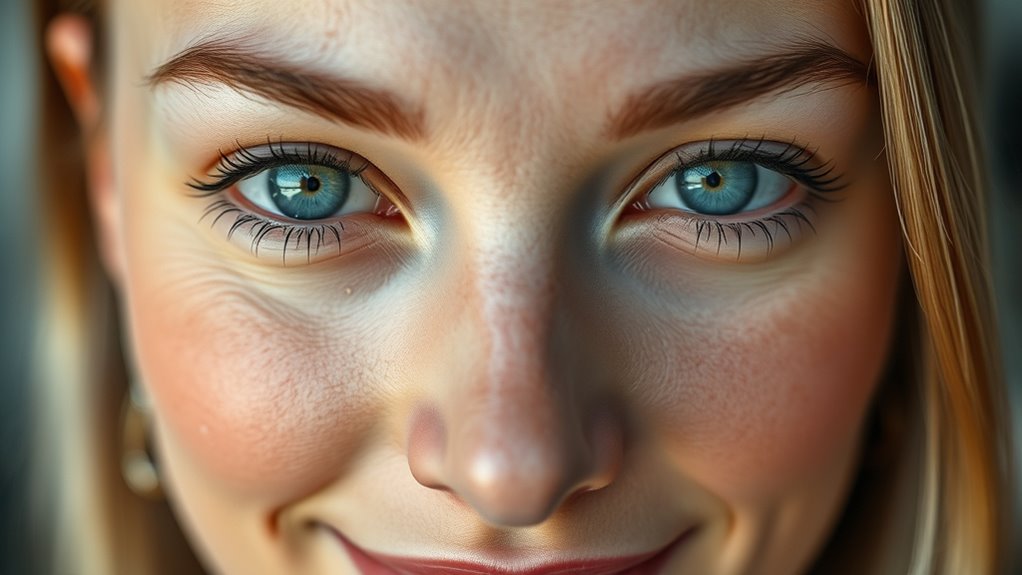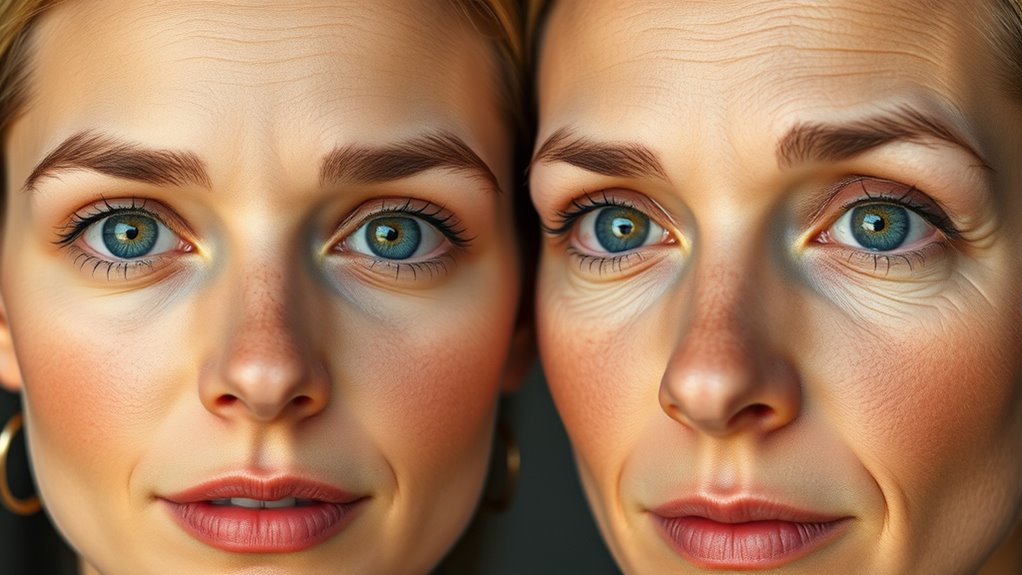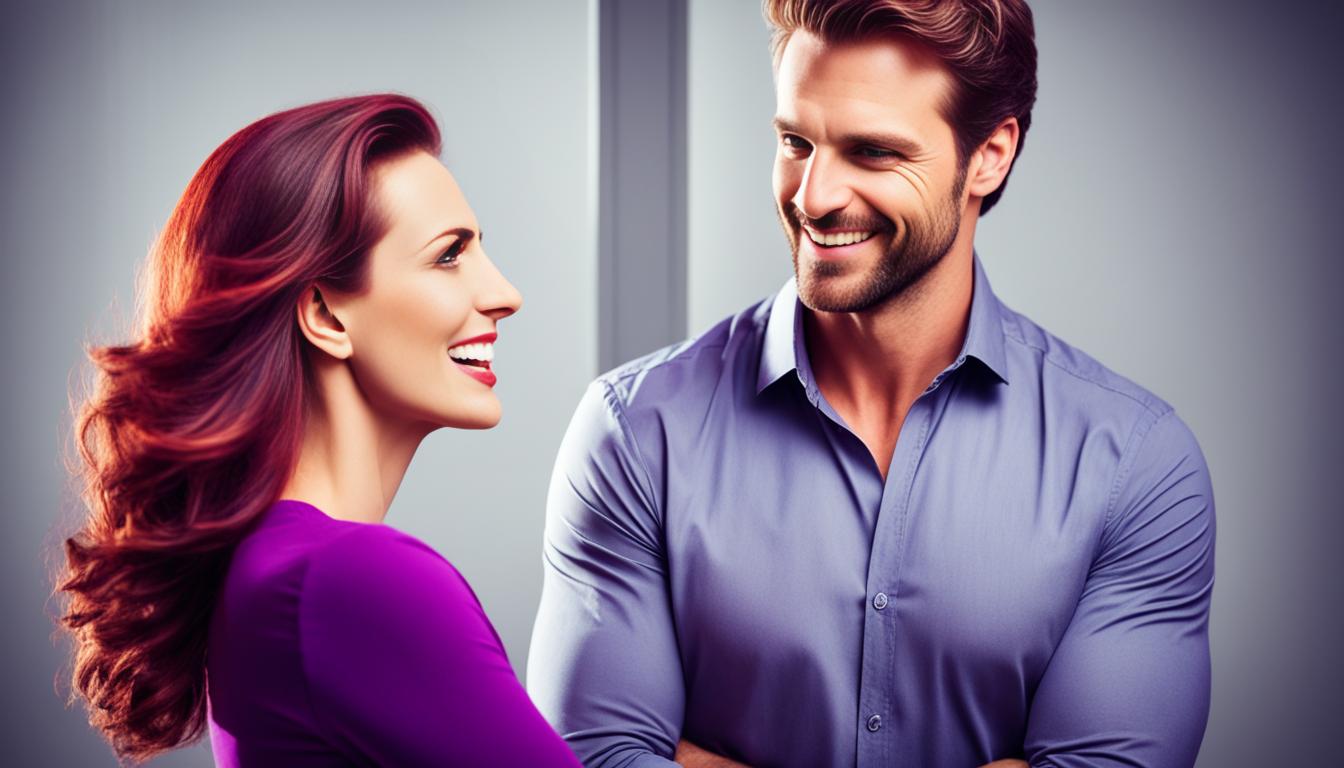Facial symmetry is often seen as a key factor in attractiveness, but it’s really just one piece of the puzzle. While symmetrical faces are generally perceived as more attractive, minor asymmetries add character and uniqueness that can enhance your charm. Cultural standards and personality also play huge roles in how people perceive beauty. If you keep exploring, you’ll discover how true attractiveness encompasses much more than just symmetry.
Key Takeaways
- While facial symmetry is linked to attractiveness, slight asymmetries often add character and uniqueness.
- Perfect symmetry is rare naturally; cultural standards and personal preferences also shape beauty perception.
- Excessive emphasis on symmetry can create unrealistic beauty ideals, overlooking individual charm and personality.
- Facial asymmetries are normal and can enhance a person’s distinctive appeal and authenticity.
- Embracing natural features and asymmetries promotes self-confidence and challenges narrow societal beauty standards.

Facial symmetry plays a significant role in how people perceive attractiveness, often serving as a key indicator of health and genetic fitness. However, it’s important to recognize that perfect symmetry is rare, and small facial asymmetries are completely normal. When you look at yourself in the mirror, you might notice slight differences between one side of your face and the other. These asymmetries are natural and usually unnoticed by others. In fact, researchers have found that minor facial asymmetries can even add character and uniqueness to your appearance. The idea that symmetry equals attractiveness has been popularized, but it’s essential to understand that this isn’t the whole story. Cultural beauty standards influence how societies view facial features, and what’s considered attractive can vary widely across different cultures and time periods. In some cultures, features like high cheekbones, full lips, or specific facial proportions are prized, regardless of whether the face is perfectly symmetrical. These standards shape what you see as beautiful and can influence how you perceive your own face. The media often promotes a narrow definition of beauty, emphasizing flawless, symmetrical features, but real-world attractiveness is much more nuanced. You might find someone with slight facial asymmetry incredibly charming, or you might admire facial features that deviate from the “ideal” symmetry. The emphasis on symmetry can sometimes lead to unrealistic beauty expectations, which can impact self-esteem. It’s worth remembering that beauty isn’t solely about symmetry; personality, confidence, and charisma often play bigger roles than perfect proportions. Furthermore, research shows that individuals are generally more attracted to faces that display a healthy, lively appearance, which isn’t always perfectly symmetrical. Your unique asymmetries can even become a part of what makes you attractive and memorable. Additionally, studies indicate that highly symmetrical faces are often perceived as more attractive, but this does not mean that asymmetry diminishes overall appeal. Cultural beauty standards evolve, and what’s considered beautiful today may change tomorrow. Embracing your natural features, including any asymmetries, helps foster a healthier body image. When you understand that facial asymmetry is normal and that beauty standards are culturally constructed, you gain a more balanced perspective on attractiveness. Ultimately, attractiveness isn’t about conforming to an arbitrary ideal; it’s about embracing your individuality and the qualities that make you uniquely you. Recognizing the influence of cultural beauty standards and accepting your facial asymmetries can boost your confidence and help you see beauty in your own reflection.
Frequently Asked Questions
Does Facial Symmetry Influence Perceived Intelligence?
You might wonder if facial symmetry influences how intelligent you seem. While some believe symmetry boosts perceived intelligence, research shows facial asymmetry doesn’t substantially impact perception accuracy. Instead, people tend to judge intelligence based on other factors like facial expressions or grooming. So, don’t worry if your face isn’t perfectly symmetrical; your intelligence perception isn’t solely tied to facial asymmetry, and confidence plays a bigger role.
Can Facial Asymmetry Be Corrected Surgically?
Think of your face as a canvas with unique brushstrokes. If you’re considering cosmetic procedures, surgical options can help correct facial asymmetry, much like artists refining their work. You can explore options like fillers or reconstructive surgery, which target specific areas. While perfect symmetry isn’t always achievable, these procedures boost confidence and harmony, transforming your face into a masterpiece that reflects your true self.
How Does Age Affect Facial Symmetry and Attractiveness?
As you age, you’ll notice effects like skin sagging and volume loss, leading to symmetry decline in your face. These aging effects can make features appear uneven, impacting perceived attractiveness. While natural, these changes often highlight asymmetries that weren’t obvious before. Embracing skincare, cosmetic treatments, or surgical options can help restore some symmetry, but understanding that aging naturally influences facial balance is key to managing expectations.
Is Symmetry More Important Than Facial Expressions?
You might think symmetry is the key to attractiveness, but facial harmony and emotional expression often matter more. While symmetry contributes to a balanced look, genuine emotional expressions convey personality and warmth, which draw people in. You should focus on a natural balance where facial harmony enhances your emotional expressions, making you more appealing. Ultimately, authentic expressions and overall facial harmony create a more attractive and engaging appearance than symmetry alone.
Do Cultural Differences Impact Perceptions of Symmetry?
You might wonder if cultural differences influence how people perceive symmetry. In reality, cultural beauty standards shape perceptions, making some societies value symmetry more than others. While universal ideas of attractiveness exist, your cultural background can lead you to prioritize certain facial features over strict symmetry. So, yes, cultural differences do impact perceptions of symmetry, as beauty standards vary worldwide and influence what you find attractive.
Conclusion
Remember, beauty isn’t just skin deep—it’s about the whole package. While facial symmetry has its appeal, it’s not the be-all and end-all of attraction. Don’t fall for the idea that perfection is everything; sometimes, it’s the little quirks that make someone truly mesmerizing. Keep in mind, appearances can be deceiving, and true beauty shines from within. So, don’t judge a book by its cover—what’s inside counts more than what meets the eye.










